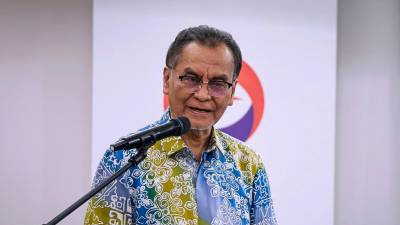KUALA LUMPUR: More than 254,000 Malaysian adults have been identified as obese under the National Health Screening Initiative this year.
Health Minister Datuk Seri Dr Dzulkefly Ahmad stated that screenings involving 1.2 million adults nationwide conducted up to September 2025 found that 30.9% were obese.
He further revealed that another 30.8% of those screened were classified as overweight.
“This is a wake-up call for all of us,“ Dzulkefly said in the closing remarks of the My Best Me Obesity Awareness Campaign.
He emphasised that “obesity is not merely a lifestyle issue but a pressing public health challenge that demands early detection, intervention and a shift in public perception.”
The minister cited the 2023 National Health and Morbidity Survey which revealed that 54.4% of Malaysian adults were overweight or obese.
This figure marks a 22% increase in the national overweight and obesity rate since 2011.
“People living with obesity face much higher risks of diabetes, cardiovascular disease, stroke and cancer-conditions that collectively account for over 70% of deaths in Malaysia,“ he added.
Dzulkefly highlighted the significant economic burden, noting that obesity costs the nation “more than RM64 billion annually through healthcare spending, productivity losses and premature mortality.”
He stressed the urgent need to end the stigma surrounding obesity.
Dzulkefly added that those affected are often unfairly judged as lacking willpower instead of being recognised as facing a genuine health condition.
“The narrative on obesity must shift from blame to understanding and from judgement to support, to ensure those affected receive accurate information, timely care and compassion,” he stated.
According to the minister, the Health Ministry is introducing integrated clinical obesity management at the primary healthcare level.
This initiative will begin with 10 health clinics and expand in phases across the country.
The programme will be supported by structured referral pathways, multidisciplinary teams and trained personnel.
Dzulkefly explained that for many years, efforts have focused primarily on non-pharmacological approaches.
These approaches include “promoting healthy diets, encouraging physical activity and strengthening behavioural support.”
“While these remain essential, we are now shifting towards a more integrated approach which also includes pharmacological treatment and, where appropriate, surgical options to effectively manage obesity as a chronic condition,” he said.
He concluded that combating obesity requires a whole-of-government and whole-of-society effort.
Dzulkefly emphasised that non-governmental organisations, academia, industry and communities all play vital roles in addressing this health challenge. – Bernama
